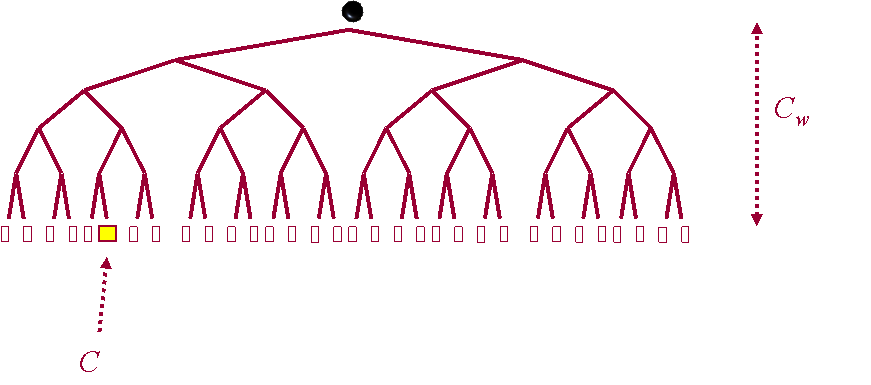SimplicityTheory |
Simplicity, Complexity, Unexpectedness, Cognition, Probability, Information
by Jean-Louis Dessalles (created 31 December 2008, updated April 2016)
![]()
Some events require complex combinations of circumstances |
Generation complexity (or causal complexity) measures the minimal amount of instructions that should be given to the W-machine ("world machine") for it to generate the event.
The W-machine represents the "world" as the observer knows it or imagines it.
| In pachinko, small balls are fired by the player to the top of the machine. They fall down through an array of pins that alter their course. Most balls end up in a collector and are lost for the player, but some may reach winning pockets. |
|
The following example (see figure below) is inspired by the pachinko game. Imagine that a ball falls down along a binary tree such as the one depicted below. At each branching node, it must "decide" whether it should turn right or left. It eventually reaches a leaf of the tree after k such decisions. The generation complexity of the event "the ball reached leaf x" amounts to Cw = k.

Note that most events of the type "the ball reached leaf x" are not unexpected. By definition, unexpectedness is the difference between generation complexity (as defined here) and description complexity: U = Cw – C. As there are 2k leaves, one generally needs C = k bits to single out one of them. Therefore, unexpectedness U = 0 for most leaves. However, if the observer can use a simple feature to single out the winning leaf (e.g. the only coloured leaf), then C = C(f) and unexpectedness U = k – C(f) may be large. Note that C(f) is small, as f is the only perceptual feature among leaves.
Individuals are able to combine several basic machines to assess Cw.
The W-machine is a computing machine that respects the constraints of the "world". It is given the current state of the "world" as input. The W-complexity is the additional input that must be given to the W-machine for it to generate the situation. An object b that is considered to belong to the known "world" requires zero complexity to be generated: Cw(b) = 0.
Caveat: the world taken as reference has no objective character; it is the world as it is known by the observer (or, in the case of fiction, imagined).
Dessalles, J-L. (2008b). La pertinence et ses origines cognitives - Nouvelles théories. Paris: Hermes-Science Publications.
Dessalles, J.-L. (2013). Algorithmic simplicity and relevance. In D. L. Dowe (Ed.), Algorithmic probability and friends - LNAI 7070, 119-130. Berlin, D: Springer Verlag.
Saillenfest, A. & Dessalles, J-L. (2015). Some probability judgments may rely on complexity assessments. Proceedings of the 37th Annual Conference of the Cognitive Science Society, to appear. Austin, TX: Cognitive Science Society.
![]()